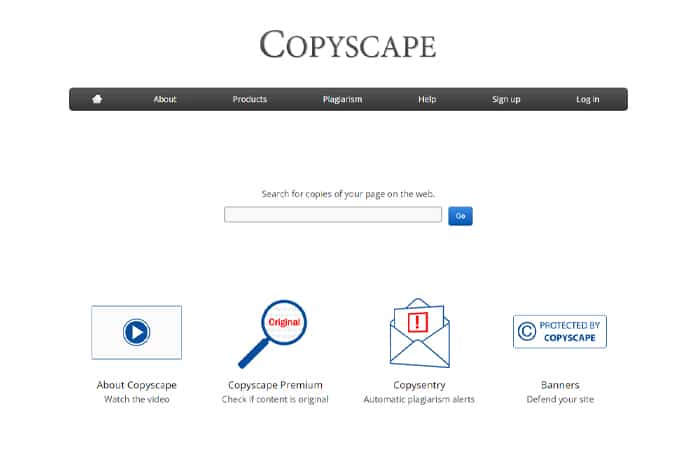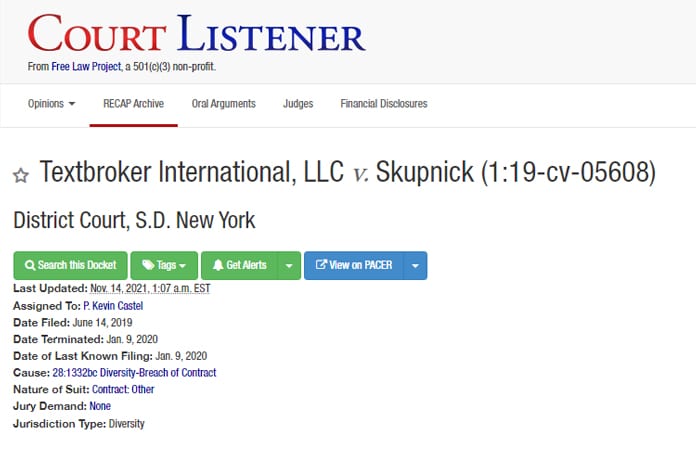Content writing is a mature industry, but that doesn't mean it's a safe one. Scams abound, from individuals simply trying to commit fraud to systemic abuses and institutionalized scams that persist simply because no one being scammed has the resources to fight it.
Scams in freelance writing can be discussed from two points of view: from writers looking to avoid working for scams and from businesses looking to not get scammed by "writers." Today, we're focused on the latter.
Scams take on many forms, and to a certain extent, you just need to be on your toes. Sometimes, people can seem very real, very reliable, and very trustworthy, only to betray your expectations when they see a big enough payday. Other times, the scam is obvious and easily avoidable.
 It's always wise to be aware of the ways you can be scammed as a business owner.
It's always wise to be aware of the ways you can be scammed as a business owner.A common scam on freelance platforms like Freelancer or Upwork is people who register accounts claiming to be an individual or entity they aren't.
This happens most for people impersonating clients, but it can happen the other way around as well. There are noteworthy freelance writers who have their own sites and their own processes, so it may surprise you to find them on a freelance platform. It may be even more surprising to find that they have a relatively new profile with few or no reviews.
Or, maybe they make it sound legitimate if you ask them about it. "I just wanted to broaden my options and look into other new clients" or some such story. The truth is, it's fairly likely that these famous, noteworthy industry specialists aren't actually using the freelancing platform. If they want more clients, all they need to do is post on their websites asking for them, or ask their existing clients for referrals.

This may also happen with applications outside of those kinds of platforms, though it tends to be much easier to verify in that case. After all, if someone emails you claiming to be someone they aren't and that someone else has a publicly available email address, it's easy to compare and see that they aren't the same.
If you fall for this scam, chances are you'll be getting sub-par writing, or even copied and spun writing, for a much greater charge than it's worth. After all, this scammer is using the name and reputation of someone much more famous so they can rake in the rates those famous people receive. Luckily, this scam is relatively rare.
Perhaps the most common scam is receiving writing that doesn't cut it. You'll generally see three forms of writing here.
 The first is straight-up plagiarism. Scammers may be more than happy to accept an assignment from you, copy some random site from the 10th page of Google as their source, hand it in as if it was their own, and run when the paycheck clears. If you don't catch it right away, they might keep at it until you do and then ghost you. At that point, you'll find that most or all of the information they used was invalid, and you have no way of recouping your losses.
The first is straight-up plagiarism. Scammers may be more than happy to accept an assignment from you, copy some random site from the 10th page of Google as their source, hand it in as if it was their own, and run when the paycheck clears. If you don't catch it right away, they might keep at it until you do and then ghost you. At that point, you'll find that most or all of the information they used was invalid, and you have no way of recouping your losses.
The easiest way to detect this is to use Copyscape. Copyscape is probably the best plagiarism detector on the market, at least at the consumer level, so it will detect whole or partial plagiarism in the content you receive. You can also manually check by finding unique lines from a piece and Google searching them in quotes.

 The second kind of invalid content is spun content. There are a number of different apps and programs on the market that, with varying degrees of sophistication, can take one piece of content and make it look like it's unique. The simplest versions use a thesaurus to replace words with similar words. More complex versions may use more nuanced algorithms or even penny-per-page freelancers to manually spin it.
The second kind of invalid content is spun content. There are a number of different apps and programs on the market that, with varying degrees of sophistication, can take one piece of content and make it look like it's unique. The simplest versions use a thesaurus to replace words with similar words. More complex versions may use more nuanced algorithms or even penny-per-page freelancers to manually spin it.
These are harder to detect, but you can often identify them by spotting strange word choices. If you ask for a post about planting flowers and you see a sentence about "interring" the seeds, well, maybe the original was "burying" the seeds, and it got spun with no attention to detail.
 The third kind, which is growing more popular, is content produced by neural networks or AI writers. These are technically "unique", but it violate's Google's Guidelines and can earn you a penalty. AI content also lacks nuance, creativity, or unique value. These are much harder to detect but often feel "off" in some way and stray off topic. Use your best judgment. If it's a serious concern, you may consider looking into AI-versus-AI tools.
The third kind, which is growing more popular, is content produced by neural networks or AI writers. These are technically "unique", but it violate's Google's Guidelines and can earn you a penalty. AI content also lacks nuance, creativity, or unique value. These are much harder to detect but often feel "off" in some way and stray off topic. Use your best judgment. If it's a serious concern, you may consider looking into AI-versus-AI tools.
This one is a scam specific to freelancer websites. If you're using a site like Textbroker, Writer Access, Freelancer, Upwork, or Verblio, chances are you had to agree to a terms of service when you joined. You might not remember it, but one of the key sections of that ToS is a clause that requires you to perform all communication with your writers through the messaging tools on the platform.
These clauses exist to protect the platform. After all, when you use the platform, you're paying X amount of money, and the writer is receiving X minus a platform fee. That fee goes to the site, and if you and the writer hook up outside of the site, the site loses that money.
When a writer asks to circumvent the platform, there are only a few reasons why.
The first and most straightforward is that the writer wants to get paid more but knows you might balk at the higher cost. If they cut out the middleman and have you pay them what you would have paid the platform, they get a raise, and you still pay the same amount.
The risk to this is that you lose any of the additional features and protection inherent in the platform. Textbroker, for example, runs everything through Copyscape themselves. If you were to pull yourself off the platform, you have to take up that burden. The same goes for things like contracts, escrow for payments, and other aspects of working with a freelancer that the platform usually handles.
You also run the risk of being pursued for breach of contract by the platform. It has been known to happen, though more often, they go after the freelancer who initiated the move and would simply ban your account and wash their hands of you.

Unfortunately, many times when a freelancer approaches you to move work off a platform, it's more nefarious:
 Scammers will target you and ask you to move off-platform because then they can ask for direct payments and ghost you.
Scammers will target you and ask you to move off-platform because then they can ask for direct payments and ghost you.
This is most likely to happen if you have a major, large project with a large paycheck attached.
A common form of scam targeting businesses is invoice scams. Businesses are used to receiving invoices, rubber stamping them, and paying them without a second look. A certain amount of inflation in services provided and various additional charges is expected – and heck, businesses do it to customers all the time too.
Where it becomes an issue is when the scale grows too great. A writer who charges you per word might add a few dozen or a few hundred words to a project, but that's not going to make or break a piece of content. A writer that starts adding "service fees" or fees for additional work beyond their writing might be trying to sneak some in without you noticing.

Ideally, payment terms will be outlined in your contract, and you shouldn't have to worry about this kind of fraud. Just make sure to review any invoices you're asked to pay. If you don't have a contract, well, get on that. There's no reason to do business without one when they're so easy to produce, and they offer so much protection that it's just plain dumb not to use them.
Some scammers focus less on mechanical scams and obfuscation and more on emotional manipulation and social engineering.
This is more common when they tend to work with individuals and small businesses rather than larger companies, though it can happen to anyone. Their goal is to find marks who have as few additional layers of verification as possible. If you have the authority to approve a payment, you're a target; if you have to go to your boss, who has to go to payroll, that's a whole other story.
The scam here is that the scammer will near a deadline and then come to you with a story of some tragedy. Maybe their car was in a collision, and they're stuck without it. Maybe they're short on rent and risk being evicted. Maybe a medical issue is burdening them will bills.

Sounds plausible, right? That's the point. Any of these can happen to anyone. Your best response to these scammers is, "Sorry, we're not in a good position to help out financially at this time; if you can't turn in the work on time, we'll find someone else."
The trouble is, that's heartless, and if your writer is a real person in a real desperate situation, it sucks to hang them out to dry like that.
On the other hand, that's the precise groundwork for the emotional manipulation they want to pull on you. Their $500 advance turns into $1,000, turns into $2,000, turns into more, and while they might try to hand in some sub-par work along the way ("Sorry it's bad, I'm just so stressed with all that's going on, you know?") you won't get nearly what you paid for.
Of course, the moment you start questioning the validity of their story is when they cut and run. Some may try to forge documents or have a suspiciously-similar-sounding third party vouch for the situation, but most won't try to push the scam any further.
Your best option for avoiding these scams is to ask for validation of the problem as soon as possible. If you don't feel comfortable doing it on your own, make up a boss or payroll department you need to sign off on first.
This is another twist on a common scam.
In freelance writing, and really any freelance services, there's a lot of risk assumed by the service provider. Scams are much more commonly aimed at freelancers than at the companies that hire them because freelancers are much less likely to have the resources to fight back.
So, if you're interested in hiring a freelancer and they seem talented and receptive, would you think twice about providing them with an ID and a few key pieces of information to verify you are who you say you are? If it makes them feel better, why not, right?

Well, that's fine, until they start asking for information you really shouldn't give out. That information can then be used against you, either as raw identity theft, as part of a spear-phishing campaign targeting your bosses or your company in other ways, or even used to "verify" your "identity" when the scammer turns around and pretends to be you.
Verifying you are who you say you are is important, but you shouldn't need more than an official email address to do so. The more they ask of you, the less likely they are to be asking in good faith.

Have you experienced fraud or scams from one side of the equation or the other? It's distressingly common, so I'm betting many of you have. Now, I'm not asking you to name and shame specific clients or writers here – that's better done in other venues – but if you have a specific kind of scam I've missed, please leave your story in the comments. We're all in this together, and the more awareness we can all build, the better off we'll be.
Do you have any questions about content writing scams or how you can avoid them? Are you concerned that you may be involved in a potential content writing scam, and would like some advice? If so, please be sure to also leave us a comment! We're here and ready to assist you however we possibly can!
We encourage you to share this article on Twitter and Facebook. Just click those two links - you'll see why.
It's important to share the news to spread the truth. Most people won't.